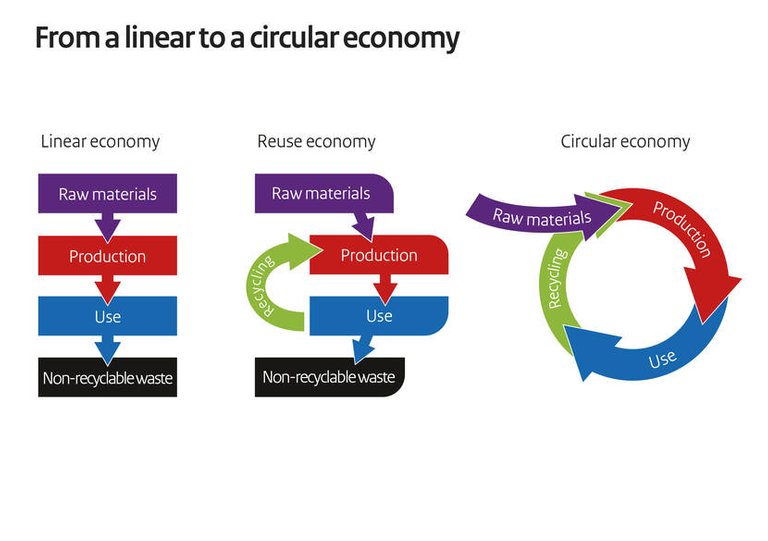WHY Buying Less Is Better Than Buying 'Green'

Renewables for endless growth is just another mirage. This is the dirty secret of Cap-and-Trade schemes that regulate carbon dioxide (CO2) and other emissions!
Buying less is better than buying 'green'—for the planet and your happiness | October 8, 2019
Humans' overconsumption of resources—from the food and clothes we buy to the methods of transportation we choose—is a leading contributor to global climate change, says the University of Arizona researcher Sabrina Helm. Therefore, it's increasingly important to understand the choices consumers make and how those decisions affect the health of a planet with limited resources.
The phrasing is kind of misleading because there is no "climate issue" but "deadly consumerism". Double talking is part of the climate consensus too.
Dismissing that "corporate nuisance" is behind our out of whack consumption is definitely a bias - but rightfully We, The Consumers, have the power to decide the fate of the planet. It is a very important step but dissolving corporate power is another one.
In a new study, published in the journal Young Consumers, Helm and her collaborators explore how culturally entrenched materialistic values influence pro-environmental behaviors in millennials, who are now the nation's most influential group of consumers.
Materialism is but a massive trap designed for the implementation of servitude. It literally is the "carrot and the stick". Accumulate as much as you can and die anyway someday - Even if stem cell research could help us reach 500 years of age, death has to unfold because the latter is what gives life meaning and otherwise. Even computers happen to have glitches or undergo cyber attacks, should you wait for (the illusion of) AI. How many back up systems would be needed to feel secure? This is another giant illusion.
The researchers focused on two main categories of pro-environmental behaviors: 1) reduced consumption, which includes actions like repairing instead of replacing older items, avoiding impulse purchases and not buying unnecessary items; and 2) "green buying," or purchasing products designed to limit environmental impacts, such as goods made from recycled materials.
And more tips in that video clips of ours in case you missed it
More materialistic participants, the researchers found, were unlikely to engage in reduced consumption. However, materialism did not seem to have an effect on their likelihood of practicing "green buying." That's probably because "green buying," unlike reduced consumption, still offers a way for materialists to fulfill their desire to accumulate new items, Helm said.
Exactly. Green buying misses the whole point and in many instances encourages to buy even more as the guilt lessens. Addiction to buying is very real and the appalling reality is that it enriches 1% .
OCT 2019 | 0.9% of Population—Now Own Nearly Half of World's $361 Trillion in Wealth, Study Shows The bottom 56 percent of the population owns just 1.8 percent of the world's wealth (commondreams)
So not only 1% of population got richer at the expense of 99%, but in order to obtain such results the top created an environment allowing one of the biggest transfer of wealth in history ever, and which will end with a bang - in other words, an "economic depression for the masses".
Either "degrowth" will be voluntary or forced, and we, of course, should always choose "voluntary" to decrease levels of coercion. That's the goal of climate insecurity, which will enforce voluntary submission. So the opposite choice (that is how duality works) is to act individually (every household) to create a decentralized but united action rippling through the economy.
But just imagine for a few seconds that corporations wouldn't be able to function in a circular economy since most profits are generated from raw materials. That is why the recycling industry is barely existing today. The more one recycles the less there are profits to make.

ALSO SEE HERE
https://earthcustodians.net/blog/2019/08/28/the-failure-of-our-global-leadership-and-civilization/
Study participants who reported having fewer materialistic values were much more likely to engage in reduced consumption. Consuming less was, in turn, linked to higher personal well-being and lower psychological distress.
Indeed, but the deep change will also come from exposing the whole picture and with the implementation of new metaphysical values - well, these values are not new at all, they just have happened to be hidden from us for millennia.
"If you have a lot of stuff, you have a lot on your mind," she said. "Maybe you have a lot of debt because you bought all that stuff, and now you have to manage all that stuff. It requires maintenance and being organized. It's not like you buy it and you're done with it. There's a lot of burdens of ownership, and if you relieve yourself of that burden of ownership, most people report feeling a lot better and freer."
The saying that money doesn't buy happiness has been around since ever, and the looming global bankruptcy ($250 trillion world debt) will remind us of this as an indisputable fact - Indeed ownership will be soon damned.
"We've been told since childhood that there's a product for everything and it's OK to buy, and it's a good thing because that's how the economy works," she said. "We're brought up this way, so changing behaviors is very difficult."
Not told but indoctrinated instead, and any ideology coercing the mind into doing anything is anti-human rights. It goes beyond any theory using money as a premise regardless of the name we give the latter. That is why monetarism is doomed to fail - because without mind control it cannot function - so what do we do from there?
FULL ARTICLE https://m.phys.org/news/2019-10-greenfor-planet-happiness.html
To listen to the audio version of this article click on the play image.

Brought to you by @tts. If you find it useful please consider upvoting this reply.
Spending less on frivolous things is the key of being a successful capitalist. Spending less than you earn builds up your capital (savings). You can then use this saved up capital to accomplish things you would have been unable to if you weren't saving. Your life becomes much better by spending less and investing more.
Simple economics.